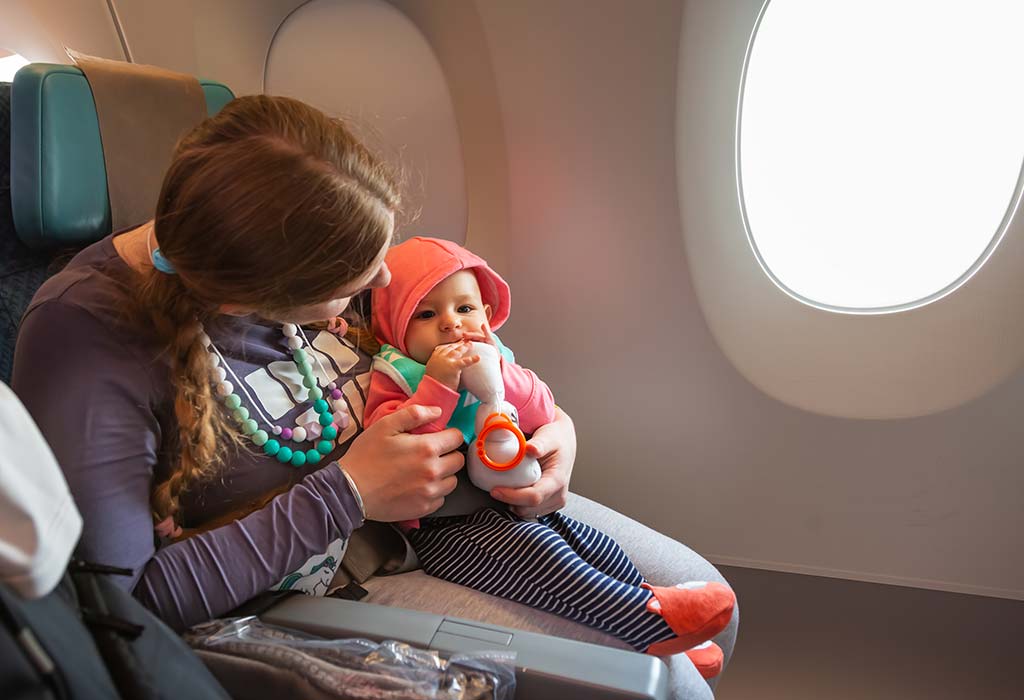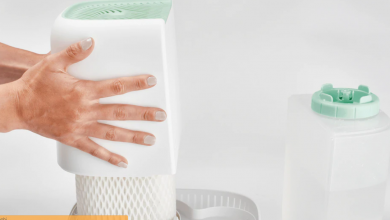How to take a baby on a plane?

Carrying a newborn on a plane can seem like a difficult undertaking, especially if the journey is long. Here are some tips for safe flying.
Your baby’s first flight can be as important as his first steps, first solid food, or first day in kindergarten. And like all of those milestones, parents can understandably feel scared ahead of time. Nobody, not even your baby, knows how he will react on a plane for the first time. Here’s everything you need to know before flying with a baby or toddler!
Newborn on the plane: at what age

Almost all air carriers accept infants on board, even in cases where they are very few days old. In general, if your baby is in good health and has no underlying respiratory or heart problems, you can travel by plane. You can be interested on the wood baby walker.
When choosing to board a plane with such a small child, however, it is important to take into consideration some factors. Newborns, especially those born very recently, have not yet received vaccinations. For this reason, they may be more exposed to viral and respiratory diseases. Pathologies that, due to the conditions of the plane, find fertile ground in flight.
In the presence of health problems, it is advisable to evaluate the opportunity of the trip with your pediatrician. In general, it is not recommended that babies fly unnecessarily shortly after birth. Air travel increases a newborn’s risk of contracting an infectious disease. Babies born prematurely, with chronic heart or lung problems, or with upper or lower respiratory symptoms may also have problems with changing the oxygen level within the air chamber. Parents should speak to the pediatrician before flying.
Air travel is also contraindicated if the baby has a severe cold at the time of departure, as the presence of mucus could exacerbate the sensation of earache and increase the risk of complications such as otitis.
In the presence of otitis, it is advisable to postpone the trip.
How to prevent ear pain?
Like adults, who need to chew or yawn during take-off and landing to avoid a blocked ear, children can also be helped. The mother could then latch him to the breast, give him a bottle or give him a pacifier.
The cost of the ticket
Children aged 0-23 months usually do not pay for the ticket. This happens because they travel by plane while remaining in the lap of a parent and then occupying his or her seat. Most of the time, however, the carrier requires at the time of booking to pay the taxes related to the flight.
Almost all companies allow you to request a seat for the baby. Otherwise (I.E., traveling in the lap of mom or dad), the child will still be entitled to a secondary belt that the parent will have to use in addition to his own.
Car seats and strollers generally don’t count as baggage, but policies vary by airline. Check your airline before flying. In most cases, they can be checked at the gate, where the risk of damage is lower, at no cost. If your child has his own seat on the plane, he takes the car seat with you.
Cradles for aircraft. Some airlines offer overhead cribs attached to the plane’s bulkhead wall, the wall behind the galley, restrooms, or another cabin. Most airline cribs require the baby to be under 6 months and/or 9 kg maximum and not yet be able to sit up on their own. Check with your airline at the time of booking.
Seat bed. For an additional fee, some international airlines allow you to reserve three seats in a row with lockable seat extensions.
Requested documents
In order to travel to european countries, a baby must have an identity card. Both parents will request it at the registry office.
What is the best place?
Look for the rows on the plane with the most space. The rows in front of the emergency exits are not accessible for safety reasons.
Choose a seat closer to the window if possible. Aisle seats can be risky for children when serving drinks. Hot drinks that are passed to passengers can spill and cause burns, and their small arms and legs can be caught bypassing trolleys. The aisle seats are also closer to the items that fall into the overhead bins.
Can I bring milk for my child?
You can bring baby food, milk and sterilized water in your hand luggage. These include:
Soy milk for babies,
Sterilized water (which must be inside a bottle)
Milk powder
Breast milk
Cow’s milk (specific for children)
Baby food.
In the case of baby milk or sterilized water, the limitation of 100 ml per container does not apply, provided that the total quantity does not exceed 1 liter. For safety reasons, the adult carrying it may be required to taste it.
A few tips to keep your child comfortable on the plane
Dress in layers
The temperature in a plane can vary greatly, especially if you’re stuck waiting on a runway, so layers of clothing are best. While choosing clothes, choose clothes that make diaper changing easier in a small space. Also, pack a change or two of clothes in case turbulence hits during a diaper change or while breastfeeding. Bring plastic bags for dirty clothing.
Be prepared for ear pain
During the ascent after take-off and descent before landing, the pressure changes between the outer ear and the middle ear can cause discomfort. It can help babies to drink from the breast or bottle or to suck on a pacifier.
Sleeping babies are easier to manage
If possible, travel at a time when your baby sleeps naturally or consider trying to postpone a nap until it’s time to fly.
Consider a diaper change right before boarding
A dry child is a happy child. Fortunately, when you need to change a diaper in flight, many planes have to change tables for the bathroom. If yours doesn’t, ask a flight attendant if there’s a spot on the floor where you can spread out your changing table. Some parents resort to changing the diaper on the closed toilet seat. If you try, make sure you always keep a hand on your baby and pack a disposable changing mat.
Bring some toys
Prepare some toys and books and be prepared to play with your baby all the time. A tablet with video can be a good backup if toys and books no longer help (we don’t encourage entertaining children under the age of 2 with the tablet, but desperate times can sometimes call for desperate measures).
Many families at this time start planning their summer holidays. In addition to the choice of destination and period, an important item obviously concerns the budget. And if you travel by plane, the cost of the holiday rises exponentially since every member of the family has to pay for a ticket, which is not always cheap. However, there are some circumstances and airlines that allow us to save on the cost of airfare for children. At what age does a child pay for the ticket on the plane? Generally, children up to 12 years pay for a discounted ticket.




